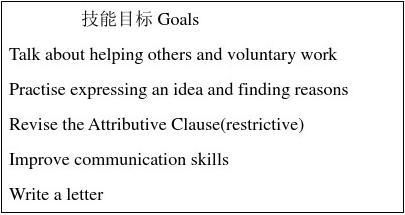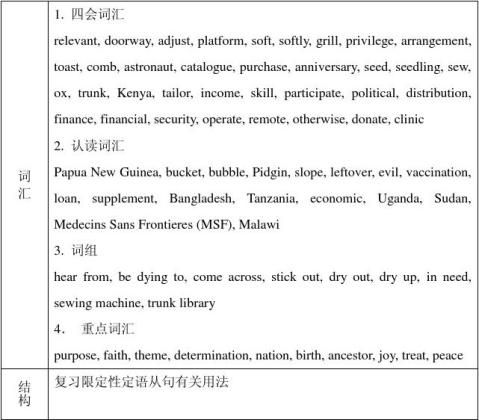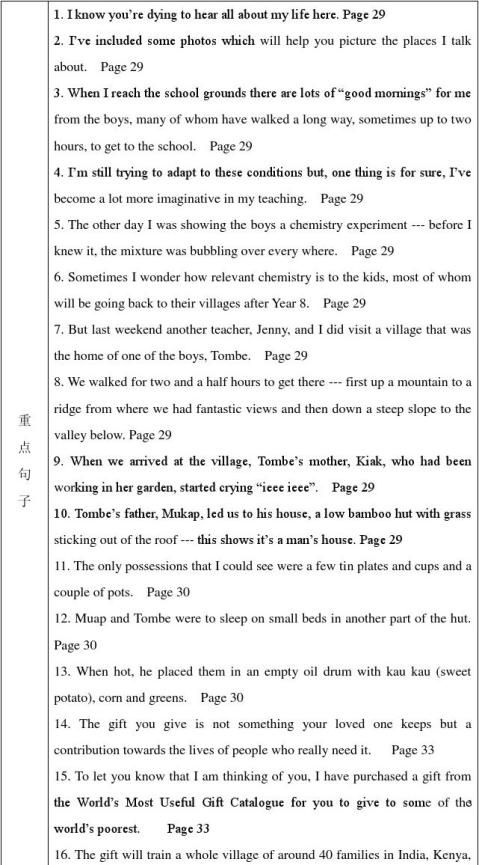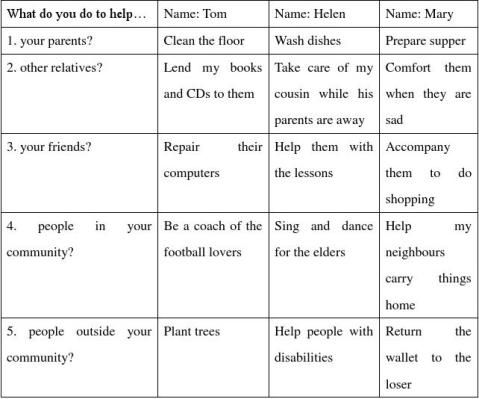高二英语选修7
高二英语选修7
Module 4 Music Born in America
Reading and Writing
教学设计说课稿
I.教学内容分析
本模块以Music Born in America为话题,介绍了美国的本土音乐,这节课是本模块的阅读与写作训练课Reading and Writing。第一部分通过阅读文章,回答三个开放性的问题,使学生开始思考音乐与学习的关系,为后面的写作做好了铺垫。第二部分要求学生根据所提供的问题,写一篇关于学习习惯的文章。 II. 教学目标
依据高中英语新课标制定如下目标
知识目标:掌握一些与音乐相关的词汇和句型。
技能目标:发展学生读写的能力,根据对短文的阅读理解,能够熟练的运用本
模块学的语法结构和词汇表达自己的意思;能够写出自己对音乐的
某种看法。
文化意识与情感目标:了解音乐在人们生活中的影响,学会客观、辩证地看问
题。
III. 学习方法:合作学习法 任务型教学要求学生在完成任务的过程中小组之间
密切配合,因此合作在这里是必不可少的。
IV.教学重点和难点
1. 教学重点
掌握一些与音乐相关的词汇和句型。
2. 教学难点
学会描写自己的学习习惯,并能写出自己对某种音乐的看法。
V. 学情分析
邦均中学的学生英语底子薄弱,知识和能力亟待提高,所以我们的英语教学目标首先是定位于让学生记住生词、短语、句型,然后在阅读的过程中分析和理解, 并尝试用英文写作。对于大部分学生来说,英语还是相当难的一个学科,所以在教学过程中,激发学生的兴趣极其重要,所以在课堂设计时我注意提高课堂的趣味性、实用性。
VI.教学方法
“授之以鱼,不如授之以渔。” As an English teacher, our task is not to teacher students English but to teach students how to learn English. 学生是学习的主人,They are learning English not from teachers but with teachers.在教学中,我采用新课标中的任务型教学法,教会学生阅读和写作的方法;在教师指导及学案引领下,以学生自主阅读、自主发展为主线;让学生在教师引领、同学互助下品位语言之美,养成良好的学习策略。
VII.教学过程
1. Lead-in
爱因斯坦有句名言:“兴趣是最好的老师。”哲学上讲内因是根本,外因要通过内因才能起作用。 所以说,要让学生学好英语,首先就要让他们爱上英语。兴趣对学习有着神奇的内驱动作用,能变无效为有效,化低效为高效。在这里首先给学生展示两组图片,师生互动,讨论问题What kinds of music do you know? Show us some examples! 引起他们的头脑风暴,联想与音乐有关的知识,引出classical music. 教师继续激发学生的兴趣,播放一曲音乐,让学生们真实感受到音乐的感染力,通过问题How do you feel after you hear the music? 让学生尝试说出自己的看法,引出话题Do you think classical music helps you study?
进入到52页课文的阅读,让学生自己去发掘文章作者的观点。
2. Fast reading
通过阅读文章,回答三个开放性的问题,训练了学生快速阅读和在有限时间内搜索信息的能力。这一部分的题目很简单,学生有话可说,也增强了他们的自信心,并使学生开始思考音乐与学习的关系,为后面的写作做好了铺垫。
3. Discussing
这一部分提供了七个讨论题,与上面的阅读密切相关,围绕着音乐对学习的影响而设计的。再次环节中,学生们通过小组讨论的形式,互相交流看法,积极探讨,积累了大量的写作信息,包括单词、短语、句型和常用句型。学生们在合作学习中,既发挥了好学生的英语基础好的长处,又为那些作文无话可写的同学扫清了障碍。有人展示有人收获,各得其所,形成了愉快的学习气氛。
4. Collection
这一部分将学生们讨论的成果进行了展示,使同学们体验了成功的乐趣。与此同时,教师对收集上来的信息进行点评和补充。并针对学生习作文章结构不明确缺乏层次感的弱项加以解释说明,使学生更明确了好作文的要求,从而提高写作质量。
5. writing
通过以上的活动,学生们头脑中已经输入了相关的写作信息,此部分正是锻炼他们将信息输出的能力,即用英语正确表达自己的观点。
6. 成果展示
将学生的习作抽样当堂点评,让每一位学生都体验一次批作文的乐趣,区分好坏,取长补短。让学生在批评与自我批评中学会正确面对学习中的成功与失败,培养他们坚持不懈的品质。
之后,教师进行指导与说明,并提供两篇正反两种观点的范文供学生学习参考,并提出改进与提高写作的建议,引导学生课下自主学习,以达到“授之以渔”的目的。
7. homework
以两组图片来引起学生的兴趣,让他们在兴趣的驱使下运用合作学习法自主完成阅读与写作的教学任务。结合本节课的训练内容,利用课本中提供的Reading Practice一篇介绍香港本土音乐的说明文,要求学生通过阅读文章,学会概括段落大意,并回答几个与文章细节有关的问题,培养学生对文章理解的能力。学习并提取其中的写作素材,用英语介绍一位自己喜欢的歌手,进一步锻炼学生在阅读中输入在写作中输出的能力从而达到我们的教学目的。
第二篇:高二英语选修7 Unit4教案
Unit 4 Sharing
I. 单元教学目标

Ⅱ.目标语言

1
2


III. 教材分析与教材重组
1. 教材分析
本单元以Sharing为话题,旨在通过单元教学,使学生了解世界上很多地方依然很落后,从而懂得同情,学会分享。结合针对短文话题的探讨激发学生的国际意识,通过各种渠道力所能及地为贫困地区的孩子做出自己贡献。
1. 1 WARMING UP 提供了三项任务。通过完成这些任务让学生懂得什么是“帮助”,并且反思自己是否乐于助人,以及怎样做才是“志愿者”,由此为后面的短文学习做好铺垫。
1. 2 PRE-READING是READING的热身活动。其中介绍了短文主人公Jo,还根据她在PNG拍的照片提出了5个问题,使学生在阅读之前就简单了解短文内容。
1. 3 READING是一篇Jo写给Rosemary的信。其中介绍Jo在PNG(Papua New Guinea)的所见所闻,使学生感受到PNG的儿童生活艰难,从而珍惜自己的学习机会。.
1. 4 COMPREHENDING 是根据短文设计的阅读理解试题。 1. 5 LEARNING ABOUT LANGUAGE分词汇和语法两部分。其中,第一部分是有关此篇短文中的重点单词和短语;第二部分是有关限定性定语从句的复习。
1. 6 USING LANGUAGE是对READING的延伸。通过阅读,参与“Give an unusual gift”的活动。
1. 7 LISTENING AND SPEAKING通过Jennifer Wells的采访介绍了Mary Murray作为MSF的一个volunteer的工作经历,而且针对这一话题展开Speaking。
1. 8 WRITING 根据LISTENING AND SPEAKING话题运用时间表达方式进行写作。
2. 教材重组 2.1 从话题内容和训练目的上分析,WARMING UP与LISTENING AND SPEAKING相一致;从教材份量来说,可将WARMING UP与LISTENING AND SPEAKING的1、2、3、4项和Workbook中的LISTENING以及LISTENING TASK 4
整合在一起,设计成一节任务型“听力课”。
2.2 将LISTENING AND SPEAKING的5、6项 和Workbook中的TALKING以及SPEAKING TASK整合在一起,设计成一节 "口语课"。
2.3 可将PRE-READING, READING和COMPREHENDING三个活动整合在一起上一节“阅读课(一)”。
2.4 可将LEARNING ABOUT LANGUAGE的词汇和语法两部分与Workbook中的USING WORDS AND EXPRESSIONS与USING STRUCTURES整合在一起上一节“语法课”。
2.5 可将USING LANGUAG中Give an unusual gift, 和Workbook中READING TASK的A LETTER FROM PLAN整合起来上一节“阅读课(二)(泛读课)”。
Ⅳ. 分课时教案
The First Period Listening
Teaching goals 教学目标
1. Target language目标语言
a.词汇和短语:
volunteer, clinic, challenging, over the last few years, in the future, in two weeks’ time, a couple of, developing country, Medecins Sans Frontieres(MSF), Malawi, Sudan, The Fred Hollows Foundation, The Cancer Council, Youth in the city, go blind, belief
5 2.6 将WRITING和Workbook中WRITING TASK整合成一节“写作课”。 3. 课型设计与课时分配(经教材分析,根据学情,本单元可以用六课时教完) 1st period 听力课 2nd period 口语课 3rd period 阅读课 4th period 语法课 5th period 泛读课 6th period 写作课
b. 重点句子:
Why did Mary decide to work in the developing countries?
Why were conditions in the clinic in the Sudan challenging?
In the Sudan, why was it nearly impossible for Mary to get to the clinics when the rains came?
2. Ability goals能力目标
Improve the students’ listening ability by listening to Dr Mary Murray’s experience as a volunteer with Medecins Sans Frontieres (MSF)
3.Learning ability goals学能目标
Learn to predict what will be heard.
Help the students understand time expressions and use them.
Teaching important point 教学重点
Learn to make notes while listening to the material and number the events in the order they are heard.
Teaching difficult point 教学难点
Learn to use time expressions and work together with a partner to describe a person’s experience..
Teaching methods 教学方法
Listening and cooperative learning.
Teaching aid 教具准备
A recorder
Teaching procedures & ways 教学过程与方式
Listening and cooperative learning.
Step I Warming Up
1. Greetings
T: Good morning /afternoon everyone!
Ss: Good morning /afternoon, Sir/ Madam!
T: Have you ever helped others? What did you do to help your parents? Or other relatives? Or your friends? Or people in your community? Or people outside your community? I’m sure you have a lot to say. Ok, let divide into groups of three and 6
finish the survey form. Then in groups, discuss whether someone who helps the groups on the survey form can be called a “volunteer”. Suggested answers:

T: Which one can be called a volunteer? Or what kind of things do volunteers do? S: Volunteer work includes: Be a coach of the football lovers, plant trees, help people with disabilities.
T: Correct. Only those who don’t work not for rewards – especially money and materials, and not forced to do so are volunteers. And not only the person but also the society and the environment benefit from it. For example, Dr Mary Murray was a volunteer with Medecins Sans Frontieres(MSF). Now turn to Page 35, read Exercises 1 and 2, and predict what you will hear in the listening material. You can also discuss with your partner.
Sa: Now Jennifer Wells is interviewing Dr Mary Murray about what has happened in Mary’s life.
7
Sb: She once worked in a clinic in Malawi and Sudan.
Sc: Malawi and Sudan are developing countries.
Sd: Many children died when she worked in Malawi.
Se: Conditions in the clinics in the Sudan were very terrible and challenging.
Sf: Medecins Sans Frontieres(MSF) is an organization that provide free medical care to children in poor countries.
T: Very good. You see, even without listening to the dialogue you can get much information, if you study the questions carefully. Now let’s listen to their dialogue. You will pay attention to the time expressions and number them in the order you hear them. (Show the 11 time expressions on Page 35). And also you will answer as many of the questions in Exercise 2 as you can.
Step II Listening(I)
(The teacher plays the tape and the students listen to it.)
T: Now let’s check the answers of Exercise 1 and 2.
(The students will answer the questions)
T: Now let’s listen to the dialogue for a second time. When you are listening, you can check the answers of Exercise 2 and finish Exercises 3 and 4. Learn to make notes about Mary’s experiences in the table on Page 35. And share your notes with your partner and then with other groups.
(The students will makes notes, and share their notes.)
T: Ok, let’s listen to it for a third time to check the notes.
Step III Listening(II)
T: Perhaps you may wonder, because we are students, what we can do to help. That is, what can we do to serve communities outside the school? Ok, let do LISTENING in the workbook on Page 70. You are also required to predict what you will hear, according to the four questions.
Sa: There are three characters in the material: Jason, Mick and Annie.
Sb: They want to raise money to help.
Sc: Perhaps they will help children in hospital, or serve soup to the homeless, or protect the environment.
8
Sd: They will spend some time working for their school’s Community Care Committee (CCC).
T: It couldn’t be better. Now we’ll listen and check our prediction and also finish the exercises on Page 70.
Step V Assignment
T: Boys and girls, today we have listened to two materials about giving help to others. I do hope all of us will help those who need help. Besides, you should learn to predict what you will hear before listening and pay attention to the time expressions while listening.
Homework for today.
1. Finish the LISTENING TASK on Page 75-76. Remember to predict what you will hear according to the given information and also pay attention to time expressions.
2. Google for more information about MSF and share it between us.
Now class is over. Goodbye, everyone.
Ss: Goodbye, sir/madam.
9
-
高二英语教师上学期工作总结
20xx-20xx学年高二英语第一学期教学工作总结作为英语老师,我认真学习各种理论,不断提高自己的师德素养和专业素养。本学期我担任…
-
高二英语第一次月考答题卷
第II卷非选择题(共60分)第三部分:知识应用(共三节,满分45分)第二节(共10小题,每题1.5分满分15分)阅读下列短文,按照…
-
高二英语选修7 Unit 3整理
Unit3整理一、单词1、annualadj每年的,按年度计算的n年刊,年鉴annuallyadvanannualfestival…
-
[整理]高二英语动词不定式巩固练习
动词不定式巩固性练习1.Youhadbetter______yourhaircut.A.hadB.haveCtogetDtohav…
-
高二英语怎么学
怎样学好高二英语1.应注重能力的培养高二英语对学生的听、说、读、写能力有了更高的要求,总的来说,高二英语应注重能力的培养,为高考以…
-
学生公寓管理员20xx年工作总结
又到一年期末时,在即将过去的一年中,我作为学生公寓的一名管理员,在学校后勤管理处的领导下,秉承“一切为了学生,为了一切学生,为了学…
-
办公室员工一季度工作总结
在办公室领导和同志的关怀、帮助、支持下,紧紧围绕县委县政府督查督办室的中心工作,充分发挥岗位职能,不断改进工作方法,提高工作效率,…
-
办公室季度总结
20xx年第二季度办公室工作总结二季度办公室在班子领导下,办公室围绕年度目标、中心工作任务和精细化管理年主题,认真发挥职能,切实履…
-
办公室xx年第一季度工作总结
办公室第一季度工作总结在公司领导的正确领导下,公司生产经营稳步进行,实现了年初公司董事会提出的“稳定发展”的基本目标。办公室自进入…
-
20xx年第一季度房地产公司办公室工作总结
20xx年第一季度公司办公室工作总结今年第一季度,办公室围“办全、办细、办快”三大工作职责,充分发挥后勤管家、督促检查、协调服务三…